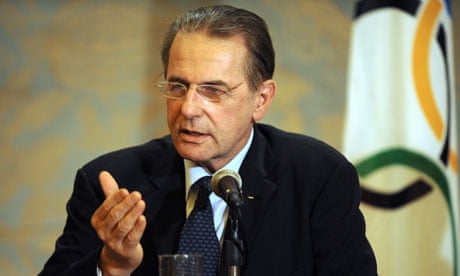The head of the International Olympic Committee has warned that any athlete not prepared to compete against a rival nation for political or religious reasons in London will be heavily punished.
The intervention of the IOC president, Jacques Rogge, comes after an Algerian athlete withdrew from a race against an Israeli rival during a recent World Cup canoeing regatta in Duisburg, Germany.
Rogge said that all 200-plus nations that will be represented in London had been warned that only serious injury would be accepted as an excuse for not competing, and that sanctions would be taken against any athlete who pulled out of a competition for other reasons. Suspicious withdrawals will be examined by a panel of medical experts.
"We have just told all the national Olympic committees that we expect all the athletes to respect the schedule of competition and not to pull out without a good reason for competition against an athlete of another country," he told the Guardian.
"If nation A does not appear at the competition against nation B we will ask for explanations. If the explanation is not satisfactory and valid at the end of it and is not credible then we will go into cross-examination by an independent medical board. And if the medical board says it is not a genuine reason then sanctions will be taken. That is quite clear."
The IOC has reminded its members of their responsibilities in the wake of an incident in which Algerian kayaker Nasreddine Baghdadi stopped paddling and returned to the dock during a 1,000 metre heat that included an Israeli competitor, Roei Yelling.
He refused to comment afterwards, but it was later confirmed that he was did so due to pressure from the Algerian government. He returned to competition the next day in the 200m heats.
The head of the Algerian Olympic Committee, Rachid Hanifi, has said it will be up to the Algerian government whether its athletes should compete against Israelis at the Games.
"I know it's a very sensitive question and this is why I said that I will discuss it with the Algerian government, conforming to the recommendations of the IOC, which advocates harmonious co-operation between national Olympic committees and their government," Hanifi told the Associated Press last week.
During the 2004 Games in Athens and the 2008 Olympics, Iran faced criticism after its athletes withdrew from events against Israelis.
"If you think about rugby, you have this wonderful sentence where England and Scotland think about each other as the 'auld enemy'. But they still play every year," said Rogge.
The IOC has reminded its member nations that failure to compete because of a rival's religion or nationality would be a breach of its code of ethics and in contravention of the spirit of the Olympic charter.
In the wake of a string of selection controversies involving Team GB, Rogge also said he believed countries should move to a more objective system for selecting their athletes that would give rise to fewer appeals.
The most high profile case has been in taekwondo, where world number one, Aaron Cook, has threatened to go to court after the British Olympic Association refused to overturn his omission, but there has also been controversy in fencing, judo, diving, wrestling and other sports.
Rogge, a former Olympic sailor, said that when he was chef de mission for the Belgian Olympic team, he insisted that the selection of athletes should be decided on clear and transparent criteria rather than left to subjective opinion.
"It is the responsibility of the national Olympic committee ultimately to decide on the selection of athletes. I was a chef de mission for five Olympic Games and in charge of selection for my NOC. I had come as an athlete from a system where the selection was rather subjective. I found that a bit unfair," he said.
"So when I became team leader, I issued a very strict rule that it should be totally objective, a little bit like the American trials. You pass the post first, you're selected. If you're ill or injured, too bad. We had a rule that said you had to be in the top of eight of the world, with room for a very little amount of interpretation. I would not interfere in the business of the BOA, but my personal feeling is that the more objective you are, the less controversy you have."
